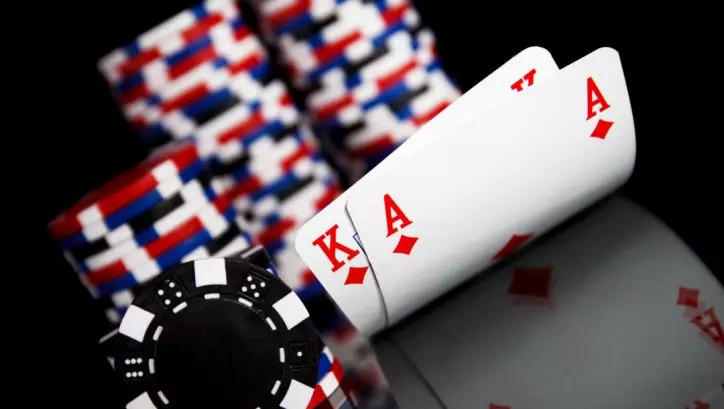Experienced players understand that an enhanced understanding of when to fold in poker leads to improved outcomes. Ace-King, often referred to as “Big Slick,” is undeniably a potent hand, yet it possesses subtleties that are often overlooked, whether you’re playing poker online or at a physical casino. These insights will provide you with an advantage.
The question that might have already crossed your mind is why, given the power of Ace-King, one should consider folding it before the flop. As is typical in discussions about poker strategy, the answer is, “It varies.”
Several factors need to be taken into account. How much action has occurred before your turn? What are your opponents’ playing styles? And, naturally, how do the stack sizes compare? We will delve into each of these aspects shortly, but it’s crucial to understand the merits of Ace-King on its own before proceeding further.
Ace-King as an Initial Hand
The Ace and King are the two highest-ranking cards in a standard deck, so it’s no surprise that most strategic preflop poker charts regard Ace-King as one of the best possible starting hands. If the Ace and King are suited, the hand becomes even more robust due to its flush potential. The odds of Ace-King suited surpassing a random hold’em hand begin at approximately -203, which is just slightly lower than pocket 10s. Ace-King offsuit is still formidable in its own right, with -186 odds of outperforming any two cards.
Therefore, you should seldom fold Ace-King before the flop. However, “seldom” doesn’t mean “never.” By identifying those exceptional situations, you can enhance your preflop poker strategy and, consequently, your results. You can start recognizing such scenarios by paying attention to specific factors during your gameplay.
Table Action

To begin with, it’s crucial to assess the dynamics at the table before arriving at a decision, both within the context of the current hand and in a broader sense. If, for instance, there has been a 4-bet preceding your action, it should serve as a clear warning sign. This is unquestionably one of those exceptional instances when folding Ace-King before the flop is the prudent choice.
Consider the scenario: multiple players have raised before you. Even if one of them is attempting a bold bluff, what kind of hand would provoke such an aggressive response from the others? This strongly implies that your hand may not be the best option. Furthermore, Ace-King doesn’t fare exceptionally well against tight hand ranges.
However, in most other circumstances, your optimal course of action is either to raise or occasionally to call. How do you decide between the two? If you’re the first to initiate the preflop action, a raise is certainly the way to go. If there’s a 3-bet, your choice between the two options will depend on various factors, such as your opponent’s tendencies, and will necessitate a more detailed examination of their playing style.
Opponent’s Playing Style
Whether you’re engaged in online poker or playing in a live setting, assessing your opponent’s playing style is paramount. If your opponent is frequently 3-betting or even 4-betting with a wide range of hands, it doesn’t necessarily mean they hold a superior hand to your Ace-King. In such a scenario, folding before the flop would be unwarranted. You can opt to call or even raise, incorporating Ace-King into a broader range.
Conversely, what if your opponent is playing conservatively, exclusively 3-betting or 4-betting with premium hands like Queen-Queen or better? In this situation, it’s advisable to simply discard Ace-King before the flop. You might consider calling a 3-bet if you have plans to capitalize on a flop with low-value cards or with potential flush and straight draws, but the likelihood is that you’re trailing behind.
Preflop Odds with Ace-King
Examining the preflop poker odds with Ace-King isn’t particularly favorable when pitted against the strongest hands. Interestingly, Ace-King is not the favorite against any pocket pair before the flop. Even Deuces (2-2) hold a slight advantage over Big Slick, with odds of approximately +101–102. The odds of a split pot are around +15,285.
Therefore, if you’re facing an opponent who typically avoids risky plays but is currently displaying aggressive tendencies, chances are you’re at a disadvantage. However, unless it’s Aces (Ace-Ace) or Kings (King-King), you’re essentially in a coin-flip situation. Ace-King suited against Queen-Queen, for instance, trails approximately 45% of the time.
Stack Size

As a general guideline, the smaller your stack size, the broader your range of playable hands should be, and this principle holds especially true in the context of online poker tournaments. Suppose you find yourself unable to cover the next ten big blinds. In that situation, folding a formidable hand like Ace-King before the flop is a luxury you can ill afford.
If you’re frequently making such conservative plays, chances are you’re folding too frequently. You’re likely to deplete your chip stack before being dealt a favorable hand. Instead of merely adopting a defensive stance, strive to optimize your chances of victory, and this includes consistently playing Ace-King when your chip stack is diminished.
Now, let’s consider the opposite scenario, where your opponent is low on chips while you are comfortably ahead. In such cases, you might contemplate the possibility of folding Ace-King, given your ample chip advantage. Nevertheless, in most cases, as the chip leader, it is advisable to exert pressure on the shorter stacks.
What about the post-flop scenario? If you connect with the board, you’re in an excellent position. Whenever you flop top pair with the top kicker, it’s advisable to make a continuation bet to extract maximum value, and it’s even better if you hit two pair or trips.
If you fail to connect with the flop while holding Ace-King, it doesn’t necessarily spell trouble. After all, it remains a drawing hand and can still create opportunities. Opting for a check-call strategy isn’t a bad approach, and if the board shows connectivity, you should consider folding in response to aggressive play.
It’s Important to Remember That Ace-King Is a Tremendous Hand despite all the discussion about when to fold it. It’s essential not to overanalyze and fold more often than necessary.
Indeed, navigating Ace-King can be challenging, but that alone should not be the sole reason for folding it. Instead, focus on the specific scenarios outlined in this article and fold only when the odds are genuinely stacked against you.
Now that you have a grasp of the fundamental principles of folding Ace-King before the flop, it’s essential to remember that theory alone won’t suffice when real money is on the line. Regrettably, there are no shortcuts; only practice and experience will lead to improvement.


